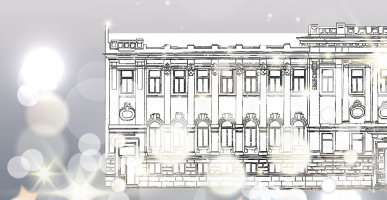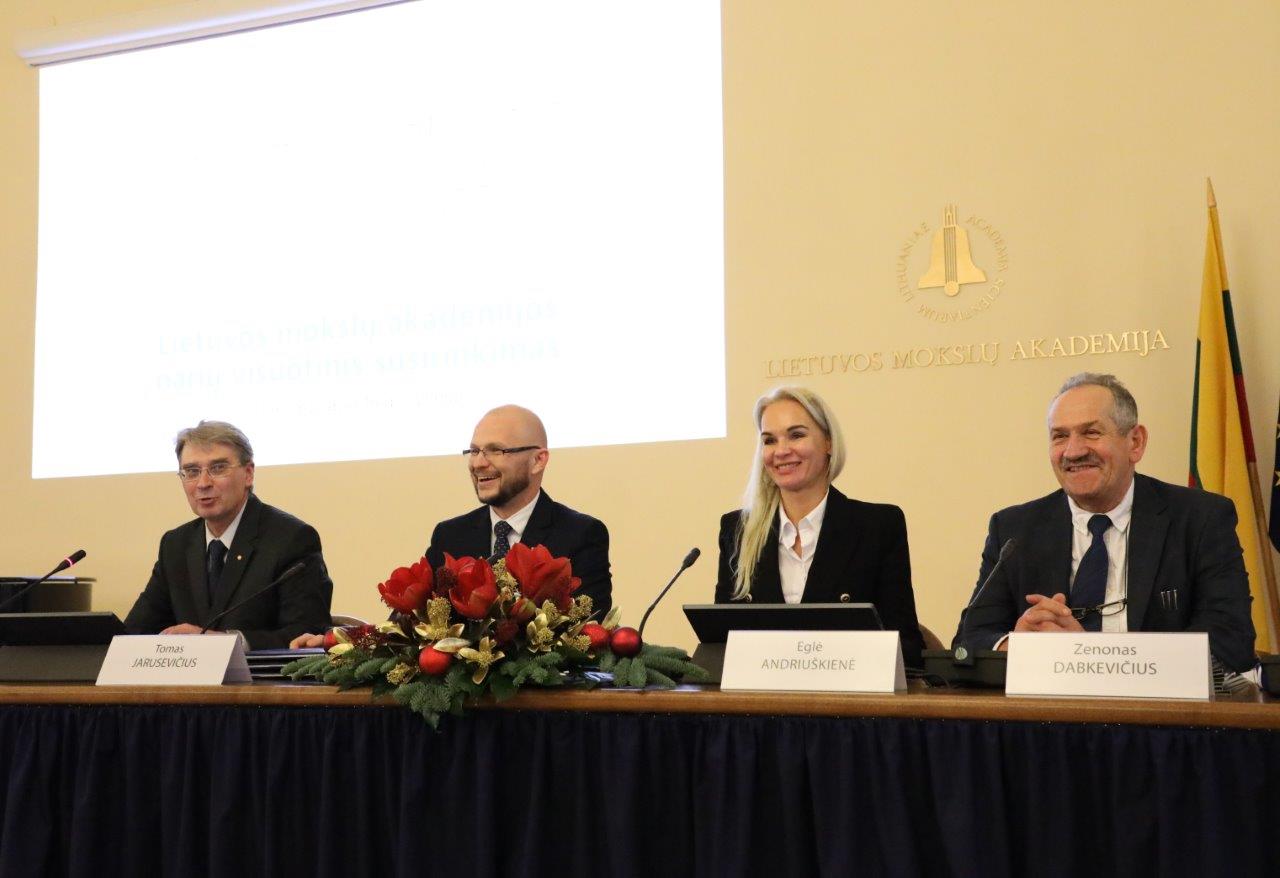Events
In the Run Up to Christmas: A General Assembly of the Members of the Lithuanian Academy of Sciences
20 12 2023
On 19 December, the Lithuanian Academy of Sciences (LAS) held a festive general assembly, which was attended not only by the Academy members but also by guests: Prof. Gintaras Valinčius, chair of the Research Council of Lithuania, Tomas Jarusevičius, vice-mayor of Kaunas, Eglė Andriuškienė, deputy director of the administration of Kaunas Municipality, the laureates of Kaunas City Science Prize, the new members of the Young Academy of the Lithuanian Academy of Sciences, and the members of the Young Academy who finished their term of office and became the alumni of the Young Academy.

From left: Jūras Banys, Tomas Jarusevičius, Eglė Andriuškienė, Zenonas Dabkevičius.
Prof. Jūras Banys, president of the Lithuanian Academy of Sciences, and academician Algimantas Grigelis, president of the Ignotas Domeika Society, awarded Ignotas Domeika Commemorative Medals to two outstanding scholars. Academician Vytautas Jonas Sirvydis was awarded for his contributions to world medical science, his significant achievements in and influence on the development of cardiac surgery, and his great humanism; he is also the initiator of a number of publications (one of them is Širdis yra graži [The Heart is Beautiful]) and of the monument ‘Lazarus, Come Forth!’ dedicated to medical doctors. The medal was also awarded to the academician Aivaras Kareiva for his world-class achievements in the field of inorganic chemistry, his leading influence on the development of higher education, and his contributions to the history of chemical science. Prof. Kareiva's book Nuostabusis cheminių elementų pasaulis [The Wonderful World of Chemical Elements] is one-of-a-kind publication in which information on all chemical elements is systematised in Lithuanian. He also initiated building a monument to Theodor Grotthuss, the founder of electrochemistry, in Žeimelis, the town next to the former laboratory of the outstanding scientist in Gedučiai Manor. This is a major contribution to the cultural heritage of Lithuania.
President Banys thanked the academicians who had contributed to the noble cause of raising funds to buy two servers for the National Academy of Sciences of Ukraine. Recalling the noteworthy events of 2023, he mentioned that the repository of the Wroblewski Library of the Lithuanian Academy of Sciences had already been renovated and the renovation of the old building is currently underway. The year 2023 was busy and eventful. He drew the audience’s attention to an exceptional event – the international conference ‘The Intellectual Heritage of the Jews of Vilnius’, which was organised by and at the Lithuanian Academy of Sciences. An agreement was reached with Vilnius Municipality on the establishment of the Vilnius City Scholar Prize. Two winners, who would be awarded cash prizes and St Christopher statuettes, would be nominated by the Lithuanian Academy of Sciences.
Prof. Banys’s speech was followed by the honouring of the winners of the Kaunas City Scientist Prize 2023. Prof. Gintautas Dzemyda, chair of the jury, announced that in the field of humanities and social sciences, the prize was awarded to Prof. Dr habil. Vytautas Levandauskas, an architectural historian at Vytautas Magnus University, for his creative and culturally innovative scientific activity and its implementation in Kaunas. In the field of natural, medical and health, agricultural, and technological sciences, the prize was awarded to Prof. Dr habil. Virgilijus Ulozas, an otorhinolaryngologist at the Lithuanian University of Health Sciences, for his innovative scientific idea and its implementation in the city of Kaunas. In his speech, Tomas Jarusevičius, vice-mayor of Kaunas, congratulated the laureates and expressed gratitude to them for their achievements. He also spoke about the science museum 'Island of Science' to be opened in Kaunas next year and expressed his satisfaction that the idea of this science museum and its origins were in the Lithuanian Academy of Sciences.
Dr Gintaras Valinčius, chair of the Research Council of Lithuania, gave a presentation on the assessment and perspectives of Lithuanian research and study institutions and answered the questions from the audience. Such assessments are instrumental for the funding of Lithuanian research institutions. In Dr Valinčius’s opinion, Lithuania has one of the best research funding systems in which results are linked to funding. One-hundred-and-thirteen experts from Liverpool, the Sorbonne, Cambridge, Helsinki, Barcelona and other universities assessed 28 universities and research institutes in Lithuania. Vilnius University, Vytautas Magnus University, Kaunas University of Technology, the Lithuanian University of Health Sciences, the Lithuanian Academy of Music and Theatre, and several others were among the leaders. Biochemistry, biology, medicine, psychology, philosophy, art history, sociology and a few others were recognised as the strongest research fields. Institutions with small teams of researchers scored the lowest. A critical mass of researchers is therefore essential for a positive assessment.
For the sixth time already, ten new members of the Young Academy of the Lithuanian Academy of Sciences were elected this year (https://www.lma.lt/news/2152/38/Naujieji-Lietuvos-mokslu-akademijos-Jaunosios-akademijos-nariai). President Banys and Vice-President Prof. Zenonas Dabkevičius presented membership badges and certificates to the new members. At the same time, ten members of the Young Academy, who were elected in 2019, finished their term of office and became alumni of the Young Academy (https://www.lma.lt/news/735/38/Isrinkti-LMA-Jaunosios-akademijos-nauji-nariai). They were presented with certificates of appreciation by the Presidium of the Lithuanian Academy of Sciences for their contribution to the activities of the Young Academy in representing the interests of young Lithuanian scientists, mobilising researchers for creative, scientific, and expert activities, raising the prestige of science, and creating progressive Lithuania.
The Grazioso trio – Joana Gedmintaitė (soprano), Viktorija Marija Zabrodaitė (flute), and Šviesė Čepliauskaitė (piano) – put a perfect festive touch to the general assembly. Irena Žilinskienė, the presenter of the trio, said that ‘Christmas is first and foremost our inner state, which we can create ourselves: Christmas is in our hearts.’ The musical greetings performed by the virtuosi of the Grazioso trio reflected this mood.
Jūras Banys, president of the Lithuanian Academy of Sciences, closed the assembly wishing everyone a beautiful and meaningful holiday season, new aspirations, and their successful implementation in the coming year 2024.
Dr Rolandas Maskoliūnas, chief specialist for public relations
Translated by Diana Barnard
